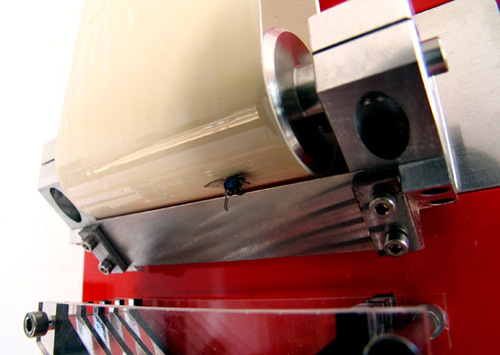Sure, you can get power from the sun and the wind and other things you could paint on the wall of a child’s bedroom — if you don’t mind being a hippy. But aren’t there any forms of alternative energy that are more, you know, metal? Enter James Auger and Jimmy Loizeau, British designers who have developed appliances that run on bugs and vermin:
The appliances are powered by microbial fuel cells, which take in organic matter (flies, mice) and convert it into electrical energy.
Auger says the gadgets aren’t really intended for mass production, and that’s probably for the best — even leaving aside the ethical issues raised by running your appliances off tiny corpses, there are some issues built in. The problem with an alarm clock that eats flies: The cleaner your house gets, the less likely you are to wake up on time. The problem with a mouse-powered table: Tables don’t really do anything, so what the hell?
Still, this is an interesting frontier. If similar technology could run off of already-dead organic matter, like table scraps, it’d be a handy way to combine composting with alternative energy (plus we’d be one step closer to the Transmetropolitan-style trash-run fabricators I’ve been coveting).
Such a future is not impossible, or even brand new. In 2009 DARPA funded research into military robots that could run on organic matter, which everyone immediately assumed meant battlefield corpses. WICKED METAL! Turns out that’s not what they meant at all, or at least so they claim, with Onion-like seriousness in the face of absurdity:
“We completely understand the public’s concern about futuristic robots feeding on the human population, but that is not our mission,” said Harry Schoell, the chief executive of Cyclone Power Technologies, one of the companies behind the machine.
Actually, the battlefield robots would eat twigs and plants, SUPPOSEDLY, and also apparently attend steampunk cons:
US officials hope that the steam-powered engine can be used by the military to create a self-sufficient robot that could survive on its own for months at a time. Possible uses put forward by the team include a battlefield ambulance or mobile gun turret.
As Keith Wagstaff at Utopianist points out, bug power could be a boon in developing nations where pest control is just as important to the standard of living as electricity:
The insect-feeding devices aren’t really what have me worried. In poor tropical areas, I can see how these could eventually be a great boon to society, as insect-born diseases and lack of power are both major problems. If you could somehow design a lamp or generator that feeds off of malaria-carrying mosquitoes to remote villages that lack any electricity, I would say call Bill Gates right away and start shipping those babies off.
Wagstaff goes on to wax philosophical about life, the universe, and energy:
It certainly is a tricky line to walk when talking about using technology to move mankind “forward,” whatever that means. The mouse-eating table certainly feels wrong to us, but why? People use mousetraps to kill rodents all the time. Rodents historically have been carriers of deadly disease and to this day can be a strain to poor families in developing countries who can little afford to lose stores of grain. Buying a cat who will disembowel a still-breathing rat is okay, but using that same rat to power a TV isn’t?
Putting aside the horrific image of carnivorous intelligent machines hunting down humans in the streets, is there any logical reason to be opposed to a project like this? Well, I guess animal rights groups wouldn’t be too keen on it, but they would probably also feel the same way about mousetraps. The point is, humans are increasingly being sheltered from what they kill. Every shiny, plastic-wrapped chicken breast you eat was a living animal that was slaughtered. If you put poison out in the garden to kill a gopher, it still dies even if you don’t see its body. That the body is used for such practical purposes as powering an electronic device certainly feels off, but if you could own what is essentially a fancy mousetrap that would limit your dependence on fossil fuels, I don’t see how I or anyone could object. Still, though …ick.


